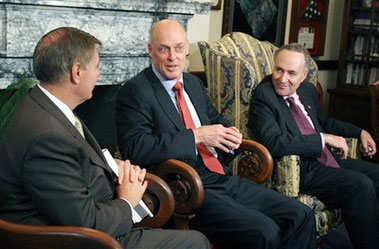US Treasury Secretary Henry Paulson said he told two legislators that
threatening tariffs is "not the right way to negotiate with China."

Treasury Secretary Henry Paulson, center,
meets with Sens. Lindsey Graham, R-S.C., left, and Charles Schumer,
D-N.Y., right,, in Graham's office on Capitol Hill in Washington, Tuesday,
Sept. 26, 2006. Paulson briefed the Senators on his recent trip to China.
[AP] |
Paulson met on Tuesday with Senators Charles Schumer and Lindsey Graham
to persuade them to delay a vote on a bill to impose tariffs on Chinese imports.
The senators said they needed time to consider Paulson's arguments before
deciding whether to call a vote this week.
"I'm doing my best job to make the case to Chuck Schumer and Lindsey Graham
that their bill wouldn't help anything, and that's not the right way to
negotiate with China," Paulson said on Wednesday in a speech to the National
Association of Manufacturers in Washington. "I've asked them to give us more
time."
Schumer, a New York Democrat, and Graham, a South Carolina Republican, are
among legislators who say that China artificially depresses the value of its
currency, the yuan, to makes its products cheaper on world markets. They argue
that the policy is costing US manufacturers sales and jobs.
Schumer said yesterday the tariff threat has been effective. He said it's the
only reason that China ended the yuan's link to the dollar in July of last year
and allowed the currency to fluctuate.
China last year ended the decade-old yuan peg and boosted its value 2.1
percent. Chinese officials said they would allow the yuan to move as much 0.3
percent a day.
The currency has rarely tested that limit and has appreciated just 2.6
percent in 14 months. Economist Fred Bergsten, director of the International
Institute for Economics, estimates the yuan is undervalued more than 30 percent.
`A Few Days'
After meeting with Paulson yesterday, Schumer and Graham said they needed "a
few days" to decide whether to push ahead with a vote this week on the bill,
which calls for a 27.5 percent duty on all Chinese imports.
Graham said the proposal has ample support and would pass the Senate, though
both acknowledged it's unlikely to become law because the House of
Representatives is not considering similar legislation.
Schumer said today he intends to discuss the tariff proposal tonight with
Senators Charles Grassley, head of the Senate Finance Committee, and Max Baucus,
the panel's top Democrat. Asked whether he intends to call a vote on the bill,
Schumer said, "We'll see."
Paulson declined to speak to reporters following yesterday's meeting. He did
speak with a group of lobbyists about his plans for negotiating with China
yesterday. Today's speech, to a ballroom filled with several hundred
manufacturing officials, was not made public by the Treasury department.
`Same Principles'
"One of the issues we always have when we talk about success with China -- we
have the same objectives, we have the same principles, but the question is
speed," Paulson said.
Paulson and Wu Yi, China's vice premier, agreed on September 20 in Beijing to
meet twice a year for talks on economic relations, the first such arrangement
between the two countries. Paulson said he hoped the US could use the new
dialogue to convince China to allow its currency to appreciate and open its
capital markets.
The first meeting under the agreement, called the China-US Economic Dialogue,
will occur this year in China. The following meeting, to take place next spring,
will be held in the US, Paulson said today. Talks will focus on "long-term"
issues, such as helping China create innovative companies and protecting the
environment.
"All that we are accomplishing here is putting a process
in place where we night be more successful than we might otherwise have been,"
he told the group. "Time will tell how successful we'll be."